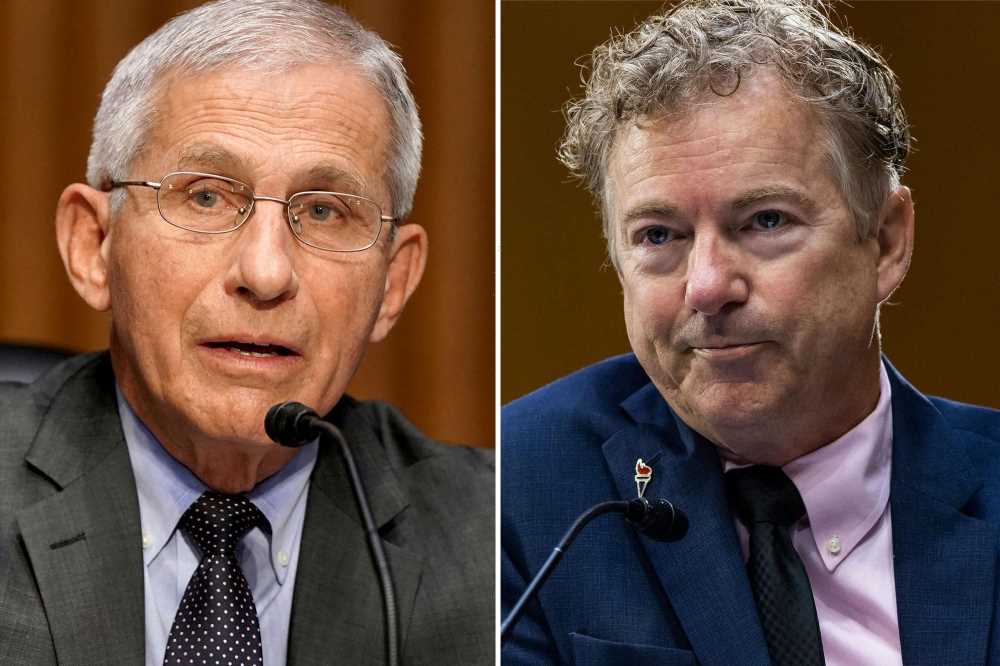More On:
rand paul
Fauci admits COVID-19 could have come from Wuhan lab, butts heads with Rand Paul
Rachel Levine becomes 1st openly transgender federal official confirmed by Senate
Donald Trump reveals who he thinks is future of ‘stacked’ GOP
Rand Paul says he was harassed by gym ‘Karen’ for refusing to wear mask
White House chief medical adviser Dr. Anthony Fauci is not being fully forthcoming about links between the federal agency he directs and the Wuhan, China, lab from which COVID-19 may have originated, Sen. Rand Paul (R-Ky.) said Tuesday.
Fauci and Paul had butted heads earlier in the day during a Senate committee hearing, during which Fauci forcefully denied that the National Institutes of Health (NIH) or National Institute of Allergy and Infectious Diseases (NIAID) funded so-called “gain of function” research by the Wuhan Institute of Virology.
That’s not true, Paul told “Fox News Primetime.”
“There’s a famous scientist in the Wuhan lab, her name is Dr. Shi [Zhengli], and she published a paper a couple years ago which has been reviewed by MIT, and says that it’s a gain-of-function research,” Paul said. “But in the byline, she has to list the sponsors. She lists Dr. Fauci and the NIAID as a sponsor of her research, which everybody acknowledges [is] gain-of-function research, juicing up these superviruses. So, I don’t know how you get around this.”
Cotton similarly told Fox News’ “The Ingraham Angle” that Fauci was being “deliberately evasive” and “playing word games with the American people” in the hearing.
Newsweek reported last year that beginning in 2014, the NIH funded research by Shi and others into bat coronaviruses to the tune of $3.7 million. Beginning in 2019, Newsweek reported, NIH and NIAID committed another $3.7 million to a six-year research program that included some gain-of-function work. The second phase of the research was overseen by the nonprofit EcoHealth Alliance.
“I’m not saying it [coronavirus] did come from the lab. I don’t know,” Paul told “Fox News Primtime” host Brian Kilmeade. “But there is a lot of evidence that makes me worried about this lab and the fact that people are not being honest, the fact that Dr. Fauci would lie and say that he didn’t give any money to this lab – now maybe his answer [is] … that he gave it to an intermediary who gave it to them, but if that’s his answer, I would think that’s kind of a curious way of saying it didn’t happen when it really did happen.”
Cotton, an early proponent of the theory that the coronavirus originated in the Wuhan lab, asked host Laura Ingraham: “Isn’t it an amazing coincidence that this once-in-a-century pandemic originated in a major metropolitan area like Wuhan, just a few hundred yards away from those laboratories? In the whole big country of China, a country the size of the United States, it didn’t come from some rural village up in the mountains near bat caves, but it came from a city larger than New York City which just happened to have these laboratories which Tony Fauci’s agency was indirectly funding.”
Paul also noted a report by New York magazine from January that an unnamed NIH deputy director attempted to cut off funding from EcoHealth Alliance to the Wuhan Institute of Virology in April 2020, leading to strenuous objections from EcoHealth President Peter Daszak.
“If Fauci’s deputy is writing a note saying that they’re going to stop the money, that implies that there was money flowing to the Wuhan Institute,” Paul claimed. “He says no money was flowing to the Wuhan Institute. Well, then why was it stopped? I mean, none of this makes sense. None of it makes sense at all.”
“Tony Fauci and his agency need to provide answers to the American people about what role they may have played in funding research in these laboratories,” Cotton said.
“Perhaps it wasn’t directly into what ultimately resulted in this worldwide pandemic, but why in the first place would American tax dollars be going to a Chinese communist lab that was conducting some of the world’s most dangerous kind of research in a laboratory that we know, that we knew three or four years ago, had various low, sloppy safety practices? “It was extremely reckless.”
Share this article:
Source: Read Full Article







